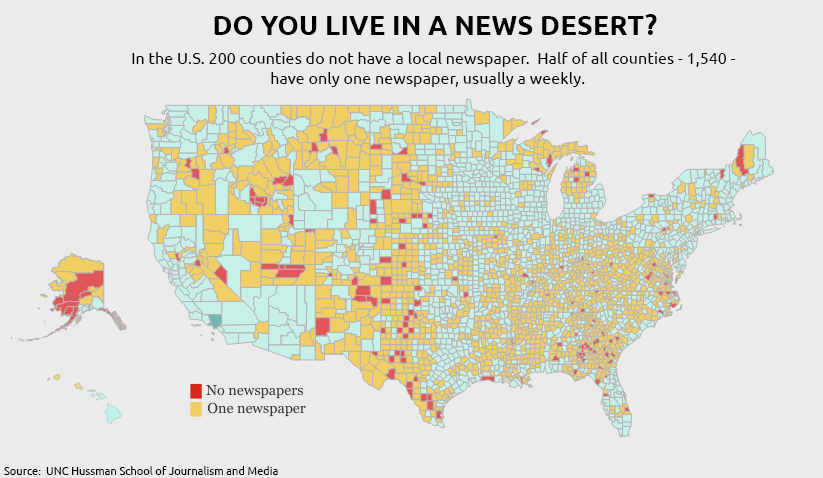EOTO #2
News Deserts: As a society, we rely on the media to keep us informed about what is happening in the world around us. We expect the news to be accurate, objective, and unbiased. However, the term "news deserts" refers to areas where access to reliable, local news and information is limited or non-existent.
News deserts can have a detrimental impact on the communities they affect. Without access to local news, people may be unaware of important events and decisions that affect their daily lives. This can lead to a lack of civic engagement and a disconnect between the community and its leaders.
Furthermore, news deserts can contribute to the spread of misinformation. Without access to reputable sources of news and information, people may turn to social media or other unreliable sources for their information. This can lead to the spread of false or misleading information, which can have serious consequences.
One solution to the problem of news deserts is for media organizations to invest in local journalism. This could include hiring local reporters and providing them with the resources they need to produce high-quality, accurate, and objective news. By doing so, media organizations can help to bridge the gap between communities and the information they need to stay informed and engaged.
In conclusion, news deserts are a serious problem that can have negative consequences for communities and individuals. It is important for media organizations to recognize this issue and take steps to address it in order to ensure that everyone has access to the news and information they need.
AI: Artificial intelligence, or AI, is a rapidly developing field that has the potential to revolutionize many aspects of our lives. AI refers to the ability of a computer or machine to mimic human cognition, including learning, problem-solving, and decision-making.
One of the most exciting developments in the field of AI is the use of machine learning. This involves using algorithms to analyze large amounts of data and identify patterns and trends. By doing this, machines can learn to make predictions and take actions without being explicitly programmed to do so.
Despite these exciting developments, there are also concerns about the potential negative impact of AI. One concern is the potential for machines to replace human workers, leading to job loss and economic disruption. Additionally, there are concerns about the ethics of AI and the potential for machines to make decisions that may have negative consequences for humans.
Overall, AI is a fascinating and rapidly evolving field that has the potential to bring many benefits, but also raises important ethical questions. It is important for researchers and policymakers to continue to address these concerns as AI technology continues to develop.


No comments:
Post a Comment